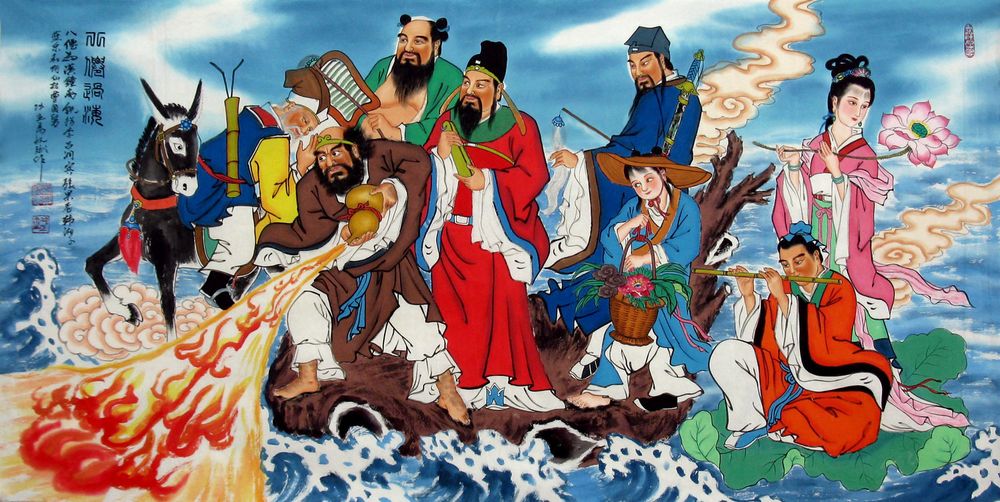I’ve got a good, but challenging, read for HSK 6 readers today: this is the classic story “The Eight Immortals Cross the Sea”, one of the most widely-known myths in Chinese culture. The Eight Immortals appear in endless traditional artworks – in paintings, as figurines, on pottery – and the story has spawned several idioms and sayings. This myth is also casually alluded to in some modern novels and pop culture, so it’s an important work to know.
There are a zillion variations on this story, the characters in it are thousands of years old, and so there is no real “original”. The details change from version to version, but the basics remain the same: the Eight Immortals (八仙) decide to show off a little, and each use their special powers (神通) to cross the ocean, the domain of the Dragon King. Their antics start a battle, which, like any dispute among powerful spirits, gets out of hand, and a few gods and goddesses have to step in to break up the fight.
Some language stuff
There are several idioms and lesser-known phrases in this piece, but the biggest linguistic lift here is the profusion of proper names: this story is like a who’s who of Buddhist, Taoist and folk mythology – many of the big deities pop in for a sentence or two. Plus, each of the Eight Immortals have a magic artifact (宝物), all of which are listed. So, if you ever wanted a rapid-fire introduction to Chinese gods and goddesses, you’ve come to the right place. The Eight Immortals are:
吕洞宾 lǚ dòng bīn – Lv Dongbin, with his magic double-edged sword (雌雄宝剑).
铁拐李 tiě guǎi lǐ – Iron Staff Li, with his metal staff (铁拐), and his magic bottle gourd (酒葫芦).
汉钟离 hàn zhōng lí – Han Zhongli, also known as Zhong Liquan, with his palm-leaf fan (芭蕉扇).
张果老 zhāng guǒ lǎo – Zhang Guolao with his mule (毛驴)
韩湘子 hán xiāng zi – Han Xiangzi with his flute (萧)
何仙姑 hé xiān gū – He Xiangu with her lotus flowers / flower basket (花篮)
蓝采和 lán cǎi hé – Lan Caihe with his magic clappers (拍板)
曹国舅 cáo guó jiù – Cao Guojiu with his jade tablets (玉版)
Other gods and mystical creatures that make a quick appearance include:
玉皇大帝 yù huáng dà dì – The Jade Emperor, supreme ruler in heaven, kind of equivalent to Zeus in Greek mythology.
西王母 xī wáng mǔ – The Queen Mother of the West, wife of the Jade Emperor, and keeper of the Peaches of Immortality.
东海龙王 dōng hái lóng wáng – The Dragon King of the Eastern Sea.
太上老君 tài shàng lǎo jūn – Exalted Lord Lao, a Taoist diety associated with Laozi, an actual historical figure who was an ancient Chinese philosopher and writer.
如来佛 rú lái fó – One of the names of the Buddha.
观世音 guān shì yīn – More commonly known as Guanyin or Kwanyin, goddess of mercy.
More important things to note:
泰山 tài shān – Mount Tai, both a mythical and actual mountain, one of China’s five great mountains, and a UNESCO World Heritage site.
虾兵蟹将 xiā bīng xiè jiàng – “Shrimp soldiers and crab generals”. As you probably know, dragons in Chinese mythology are water gods, no fire gods. So their soldiers are made up of sea creatures. In this story, the Dragon King’s armies were defeated, so in modern Chinese, the term “shrimp soldiers and crab generals” has come to mean “ineffective troops”.
蜃 shèn – My dictionary translates 蜃 as “clam”, but in this case, it actually means “mirage”. Don’t ask me how those words evolved out of the same character, I have no idea.
腾云驾雾 téng yún jià wù – Naturally, immortal beings don’t just walk around on two feet like the rest of us. Instead, they “ride the clouds and fly on the mist”. You’ll notice that in many Chinese myths, and mythological TV shows, immortals and gods jump on a cloud and fly around – this the official description of that, uh, supernatural method of transport.
有一天,八仙向西王母拜寿回来,腾云驾雾从东海上空经过,只见海上波涛汹涌,白浪滔天,煞是壮观。于是,八仙决定到海面上玩一玩。
吕洞宾说:“大家把自己的宝物扔到海面上,借着它渡过大海,比一比谁更有神通,怎么样?”
铁拐李首先对这一建议表示欢迎,他兴致昂扬地说:“好啊!大家先看我的!”便把拐杖投向海中,拐杖像一条小船漂浮在水面,铁拐李一个筋斗,翻立在拐杖上。
接着汉钟离把他的芭蕉扇丢到海上,跳下去站在上面。
接着,其他几位仙人也各显神通,张果老倒骑着毛驴,吕洞宾踏着雌雄宝剑,韩湘子坐着萧,何仙姑乘着花篮,蓝采和站在拍板上,曹国舅踩着玉版,都在海面上漂浮了起来。
八仙安稳地顺着汹涌的波浪漂去,这与腾云驾雾感觉大不相同,别有一番新的刺激和情调,大家玩得好不快意。
这时,曹国舅突然用手指向右边,并高声喊道: “大家看啊!那里有座海市蜃楼!”
大家转头一看,只见一座仙山渐渐地从海里升起,山上有树木,有楼房,一会儿就升到半空中,慢慢地变成天边的浮云,一转眼,那浮云又被风吹散了。
韩湘子说:“我们真是眼福不浅!蜃气是海里蛟龙嘘出来的气体 ,百年难得一见啊!”
突然,蓝采和从他们当中消失了。大家远近观望,一边找一边喊,可就是不见蓝采和的踪迹,张果老猜说:
“可能是东海龙王作怪,他不欢迎我们在他的海上大显神通,把蓝采和抓到龙宫去了,走, 我们一起到龙宫要人去!”
大家来到龙宫,婉言请求龙王放人。龙王蛮不讲理,不但不肯,还派自己的几个儿子带领虾兵蟹将追杀八仙。八仙只得用随身的法宝当武器,抵抗虾兵蟹将,经过一场激烈的战斗之后,龙王的两个太子被八仙杀死了。
龙王一听,自己的两个儿子被八仙杀了,真是悲愤至极,商请南海、西海、北海龙王来帮忙。龙王的不依不饶,把八仙也给惹火了。铁拐李用酒葫芦把海水吸光,其余几位仙人将泰山搬了过来,往东海一扔,东海立刻变成了一座高山。
双方打得天昏地暗,日月无光,把太上老君、如来佛和观世音也惊动了,他们全都赶来调解。调解的结果是,由蓝采和送东海龙王两片玉版,作为杀两位太子的补偿,泰山则由观世音负责搬回原处。
因为这一场纠纷,八仙被玉皇大帝降级一等。从此,八仙再也不敢到外面惹是生非了。




